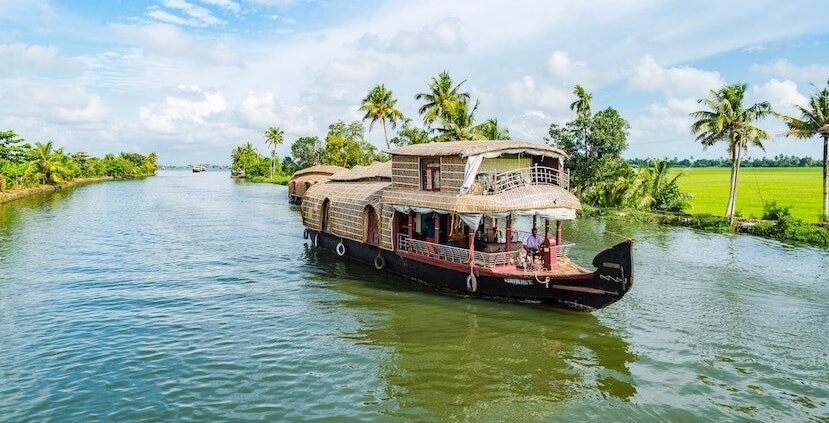
This is cornucopian-style luxury: lofty tea plantations, fertile backwaters and lavish jungle. When it comes to luxury Kerala holidays, the hill stations sown with tea plantations and canals and the lagoons strewn with water hyacinths are merely the hors d’oeuvre. Luxury in Kerala isn’t limited to its natural canapé, although it is certainly an ambrosial ingredient in a typical Kerala soiree. India’s southernmost state has a sharp sense of what’s haute and what’s not. The entrée might just be the state’s varied five-star backwater resorts, boutique city hotels and hill station rendezvous. As for the sweet course, this is surely the euphoria of experiencing India’s 2000-year-old Ayurveda medicinal healing and observing ancient dance art forms such as Kathakali, and dining on ceremonial sadya.
Compared to its northern relatives, Kerala state has a short monument count. Rather, the mise en scène is natural and carefully-curated luxury: palm forests teeming with ready-to-rupture coconuts; mountains rigged with spices like cardamom and black pepper; and even loftier lands, once occupied by the British Raj elite, and tiered with tea bushes. The teak-bamboo kettuvallam fleet that has transported the state’s most fiery spices from port to port since 3000 BCE have since been transformed into haute houseboats catering to those with a taste for the finer things. They toy for the well-heeled traveller’s attention along with backwater resorts, diagnostic Ayurveda retreats, and five-star heritage hermitages, all staples on Kerala luxury tours. The real test is tracking down the ‘haute-est’ of them all, as well as identifying luxury experiences that don’t forsake Kerala’s rich cultural heritage and wildlife for the least modest of mod cons.

In its time, Kerala has collected a number of pet names, including ‘the land of coconuts’, ‘the Venice of the east’, ‘God’s own country’, and ‘the land of spices’. Flanked on either side by the Arabian sea, the state was a Tamil region until the fifth century. A blank slate clouds the territory’s history between the sixth and eighth centuries, until Hinduism and Malayali culture, still alive and kicking in cuisine and ancient art forms like Kathakali and Kalaripayattu, reigned strong. Portuguese invasion in the late 15th century was succeeded by Dutch colonisation and then the British takeover in the late 18th century. After India’s independence in 1947, heritage villas with teak shafts, wooden rafters and tiled roofs existed side-by-side with British bungalows and Portuguese terraces decked with azulejo tiles. Luxury resorts in Kerala capture the motley heritage and preserve yet another local tradition, the ancient healing art of Ayurveda. Kerala’s Ayurvedic medicines are unique, taking the oil from coconuts rather than from sesame seeds.

Cornucopian luxury begins with Kerala’s terra firma, the soil that feeds and divides its rivers, ocean, mountains, and jungle. This is the aspect of high luxury Kerala holidays that needs no tracking down. It began when the British Raj elite claimed the spice and tea plantations of eastern Kerala as their 1900s retreat. Later, in the 1980s and 1990s, pleasure-seekers followed suit and descended upon the nectar of western Kerala’s 1500 kilometres of canals, lagoons, lakes and rivers. Along with the rare wildlife such as Asian elephants, Bengal tigers, Nilgiri tahr, and grizzled giant squirrels lurking in the state’s evergreen forests, Kerala’s natural intoxicants cannot be price-tagged. The Arabian sea coastline is another destination that’s like honey to the bee. The gilded sand and crescent coves magnetised hippies in the 1970s and continues to lasso potential sweethearts.
Still, no amount of natural luxury can cancel out an underperforming condo. Thankfully, Kerala’s luxury resort and hotel scene is just as fecund as the environment. Boutique hotels, often colonial in style but Malayali in cuisine and culture, are bounteous in Kerala’s zesty capital Cochin. Backwater resorts, Ayurveda retreats, jungle villages, and hill station strongholds take centre stage across Kerala’s north, east, south, and west, with Lake Vembanad in central-south Kerala canoodling the state’s most esteemed eco resort stays.

The five-star Kumarakom Lake Resort is arguably the objet d’art of Lake Vembanad. A collection of 16th-century traditional homesteads have been planted around slinky backwater canals, many with their personal jacuzzi and others conjoined by a meandering pool. The resort’s private kettuvallam fleet is poised to decamp onto the hyacinth-strewn lake water to absorb the nightly crepuscular light in traditional style.

Surrounded by lofty peaks, Munnar’s five-star scene is just as elevated as its tea gardens. Amber Dale Munnar is baron of the plantation peaks. Many of the 50 rooms have been bestowed with plantation-facing hot tubs. The restaurant is plantation-facing too and flowers with international, Malayali, and Malabar victuals fit to make the eyes steam. An Ayurvedic centre speciailsing in treatments such as Abhyanga is poised to prescribe rest and restoration.

A five-minute jaunt from capital Cochin’s distinct Chinese fishing nets, Forte Kochi Hotel echoes the city’s colonial past. Fashioned by the Dutch but having experienced its prime time in the 1800s as a Jewish condo, the Dutch-Portguese-British boutique hotel is refined yet modest. Its current restoration has kept typicalPortuguese balcões and azulejo tiles, but planted the bungalow with British colonial four-poster beds, and infused the restaurant menu with Malayali and pan European cuisine staples including dosa, porotta, Italian-style pizza, and spicy pepper chicken gravy.

To cruise the Venice of the east doesn’t mean to surrender to basicalties. Basic boat quarters are a-plenty, but refined, five-star luxury Kerala holidays have also made their way onto the backwaters. The five-star Oberoi Vrindia is Kerala’s go-to luxury cruiser and the east’s equivalent of a Mediterranean yacht . The vessel has eight deluxe cabins to its name, each with king-sized beds, palm-leaf canopies, traditional teak and bamboo fixtures, and French windows. Culture is of prime concern onboard, with nightly on-deck Kathakali, Carnatic tunes or traditional percussion. Spice Routes is another backwater barnacle-back and also front of the line when it comes to luxury houseboats in Kerala, with fresh lobster and mussels snagged by canal fishermen featuring in its on-deck banquets.
If comfort is a prerequisite for all luxury Kerala holidays, logic will lead many towards experiencing India’s 2000-year-old healing medicine, Ayurveda. “Ayurveda is no spa day. It’s a process,” my guide, Arun, wisely explained. The resorts go by the name hospital too, yet they are far from fevered. An Ayurvedic retreat may prescribe you a personal doctor, who may read your dosha. Informed of which of the five energies of the universe – vayu (air), jala (water), akash (space), teja (fire) and prithvi (earth) – are dominant in your body, doctors deliver holistic soul-body-mind treatments and daily rituals all in the comfort of five-star surrounds.

Throughout the state, Kerala’s spirited youth scramble to slick green and red paint over their brows and wriggle into plump bell-shaped skirts and traditional kireetam headdresses. In the 16th and 17th centuries, this kind of scene was exclusive to Kerala state’s sacred temples. The dance drama is the only oral tradition in Kerala that doesn’t speak a single word. The stories hand down Hindu epics in a medium that everyone is capable of understanding – theatre. Kathakali is as sacred to Kerala’s tradition as it is intrinsic to Kerala luxury tours. Hotels and luxury resorts in Kerala will bring the dance drama to you, maddalam drums and eye dancing included.
Whether it’s the organic lustre of Kerala’s tea plantations, backwaters and jungle or the grandeur of boutique lodgings and villa-style resorts, luxury Kerala holidays are by no means lacking. The Venice of the east is just as skilled at hatching romance, sentiment and elation as the distant Italian city. The state simply subtracts the crowds, multiplies the organic scenery, and raises the stakes when it comes to luxury hospitality.

